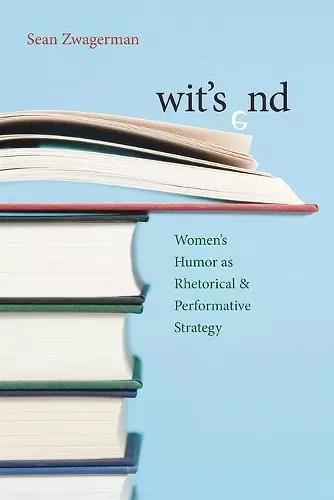Wit's End
Women's Humor as Rhetorical and Performative Strategy
Format:Paperback
Publisher:University of Pittsburgh Press
Published:25th Apr '10
Currently unavailable, our supplier has not provided us a restock date

In Wit’s End, Sean Zwagerman offers an original perspective on women’s use of humor as a performative strategy as seen in works of twentieth-century American literature. He argues that women whose direct, explicit performative speech has been traditionally denied, or not taken seriously, have often turned to humor as a means of communicating with men.
The book examines both the potential and limits of women’s humor as a rhetorical strategy in the writings of James Thurber, Zora Neale Hurston, Dorothy Parker, Edward Albee, Louise Erdrich, and others. For Zwagerman, these texts “talk back” to important arguments in humor studies and speech-act theory. He deconstructs the use of humor in select passages by employing the theories of J. L. Austin, John Searle, Jacques Derrida, Shoshana Felman, J. Hillis Miller, and Eve Kosofsky Sedgwick. Zwagerman offers arguments both for and against these approaches while advancing new thinking on humor as the “end”—both the goal and limit—of performative strategy, and as a means of expressing a full range of serious purposes.
Zwagerman contends that women’s humor is not solely a subversive act, but instead it should be viewed in the total speech situation through context, motives, and intended audience. Not strictly a transgressive influence, women’s humor is seen as both a social corrective and a reinforcement of established ideologies. Humor has become an epistemology, an “attitude” or slant on one’s relation to society.
Zwagerman seeks to broaden the scope of performativity theory beyond the logical pragmatism of deconstruction and looks to the use of humor in literature as a deliberate stylization of experiences found in real-world social structures, and as a tool for change.
Zwagerman contends that women\u2019s humor is not solely a subversive act, but instead it should be viewed in the total speech situation through context, motives, and intended audience. Not strictly a transgressive influence, women\u2019s humor is seen as both a social corrective and a reinforcement of established ideologies. Humor has become an epistemology, an \u201cattitude\u201d or slant on one\u2019s relation to society.
Zwagerman seeks to broaden the scope of performativity theory beyond the logical pragmatism of deconstruction and looks to the use of humor in literature as a deliberate stylization of experiences found in real-world social structures, and as...
"What's that funny sound?" she asked suddenly. It invariably made him angry when she heard a funny sound. "What funny sound?" he demanded. "You're always hearing funny sounds." She laughed briefly. "That's what you said when the bearing burned out," she reminded him.... "It sounds like a lot of safety pins being jiggled around in a tumbler." He snorted.... "Nothing gets the matter with a car that sounds like a lot of safety pins. I happen to know that." "Oh sure," she said. "You always happen to know everything." They drove on in silence.... - Excerpt from James Thurber's "A Couple of Hamburgers"
ISBN: 9780822960744
Dimensions: unknown
Weight: unknown
264 pages